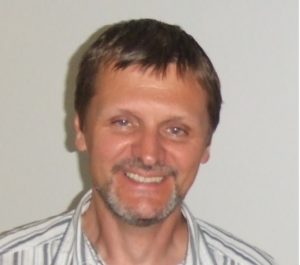Monday July 10
09:00 – 09:35 Registration and welcome coffee
09:40 – 10:00 Welcome and Introduction
10:00 – 11:00 Keynote (see details at the bottom of the page)
Dietmar Fey.
HPX: A high-level approach to standarize asynchronous and massive parallelism in C++
11:00 – 11:30 Coffee break
11:30 – 13:00 Session 1 (3 papers)
Chair: Herbert Kuchen
Clemens Grelck and Heinrich Wiesinger.
Persistent Asynchronous Adaptive Specialization for Generic Array Programming
Miguel Areias and Ricardo Rocha.
Simpler is Faster: Multi-Dimensional Lock-Free Arrays for Multithreaded Mode-Directed Tabling in Prolog
Filip Arvid Jakobsson.
Automatic Cost Analysis for Imperative BSP programs
13:00 – 14:00 Lunch
14:00 – 15:30 Session 2 (3 papers)
Chair: Clemens Grelck
Antonio Vilches, Angeles Navarro, Francisco Corbera, Andrés Rodríguez and Rafael Asenjo.
Heterogeneous parallel for template based on TBB
Ana Moreton-Fernandez and Arturo Gonzalez-Escribano.
Automatic Runtime Calculation of Communications for Data-Parallel Expressions with Periodic Conditions
Anshu S Anand, R. K. Shyamasundar and Sathya Peri.
STMs in Practice: Partial Rollback vs Pure Abort Mechanisms
15:30 – 16:00 Coffee break
16:00 – 17:00 Session 3 (2 papers)
Chair: Arturo Gonzalez-Escribano
Javier López-Fandiño, Dora B. Heras, Francisco Argüello and Mauro Dalla Mura.
GPU Framework for Change Detection in Multitemporal Hyperspectral Images
Ari Rasch and Sergei Gorlatch.
ATF: A Generic Auto-Tuning Framework
17:00 – 19:30 Free time (social event, city tour)
19:45 – 22:30 Conference Dinner
Tuesday, July 11
09:10 – 9:30 Welcome coffee
09:30 – 11:00 Session 4 (3 papers)
Chair: Massimo Torquati
August Ernstsson and Christoph Kessler.
Extending smart containers for data locality-aware skeleton programming
Fabian Wrede, Breno Menezes and Herbert Kuchen.
Fish School Search with Algorithmic Skeletons
Onofre Coll Ruiz and Kiminori Matsuzaki.
Keeping control away from computation: a computation control layer over the vertex-centric graph processing model
11:00 – 11:30 Coffee break
11:30 – 13:00 Session 5 (3 papers)
Chair: Rafael Asenjo
Rohit Atre.
Dissecting sequential programs for parallelization – An Approach Based on Computational Units
Marco Aldinucci, Marco Danelutto, Daniele De Sensi, Gabriele Mencagli and Massimo Torquati.
Towards Power-Aware Data Pipelining on Multicores
Dalvan Griebler, Renato B. H. Filho, Marco Danelutto and Luiz Gustavo Fernandes.
High-Level and Productive Stream Parallelism for Dedup, Ferret, and Bzip2
13:00 – 13:30 Presentation of next HLPP events and closing
13:45 – 15:30 Tapas lunch in the city center
Keynote
Dietmar Fey
HPX: A high-level approach to standarize asynchronous and massive parallelism in C++
Abstract
The development of processor and computer architectures in the last 10 to 15 years was mainly driven on technology side by the necessity to get the energy consumption under control. This leaded to an observed movement from single to multi-many core architectures and finally to intensified heterogeneous architectures. On the other side, this heterogeneity hindered the programming of such architectures for HPC, and in increasing way also for embedded applications. Different solutions emerged to control this complexity like library solutions, language extensions, domain-specific languages (DSLs), and experimental programming languages.
In this keynote we discuss another approach to hide heterogeneity and to establish long-term sustainability by a consequent setting on C++. HPX offers a parallel runtime system which extends the C++11/14 standard to facilitate distributed operations, to enable fine-grained constraint based parallelism, and to support runtime adaptive resource management. The keynote gives insight in the setup of HPX and demonstrates its applicability for HPC as well as compute-intensive embedded systems.
Short bio
 Prof. Dr.-Ing. Dietmar Fey holds a diploma degree in Computer Science from Friedrich-Alexander-University (FAU) Erlangen-Nürnberg, Germany. In 1992 he received a Ph.D. from FAU with a work on an investigation about Using Optics in Computer Architectures. From 1994 to 1999 he researched at Friedrich-Schiller-University Jena where he made his habilitation. From 1999 to 2001 he worked as lecturer at University Siegen before he became a Professor for Computer Engineering at University Jena. Since 2009 he leads the Chair for Computer Architectureat Friedrich-Alexander-University Erlangen-Nürnberg (FAU). His research interests are in parallel computer architectures, parallel programming environments, parallel embedded systems, and memristive computing.
Prof. Dr.-Ing. Dietmar Fey holds a diploma degree in Computer Science from Friedrich-Alexander-University (FAU) Erlangen-Nürnberg, Germany. In 1992 he received a Ph.D. from FAU with a work on an investigation about Using Optics in Computer Architectures. From 1994 to 1999 he researched at Friedrich-Schiller-University Jena where he made his habilitation. From 1999 to 2001 he worked as lecturer at University Siegen before he became a Professor for Computer Engineering at University Jena. Since 2009 he leads the Chair for Computer Architectureat Friedrich-Alexander-University Erlangen-Nürnberg (FAU). His research interests are in parallel computer architectures, parallel programming environments, parallel embedded systems, and memristive computing.